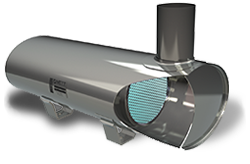Check our 3-Way Catalytic Converters designed especially for gasoline and gaseous LSI and SSI engines
What Is LPG?
Liquefied Petroleum Gas (LPG) is often incorrectly identified as propane. In fact, LPG is a mixture of petroleum and natural gases that exist in a liquid state at ambient temperatures when under moderate pressures (less than 1.5 MPa or 200 psi). The common interchanging of the two terms is explained by the fact that in the U.S. and Canada LPG consists primarily of propane (see Table 3). In many other countries, however, the propane content in LPG can be as low as 50% or less.
| Propane | 85% min. by liquid volume |
| Propylene | 5% max. by liquid volume |
| Butane & heavier HC | 2.5% max. by liquid volume |
| Sulfur | 120 ppm max. by weight |
The major sources of commercial LPG are natural gas processing and petroleum refining. Raw natural gas often contains excess propane and butanes which must be removed to prevent their condensation in high-pressure pipelines. In petroleum refining, LPG is collected during distillation, from lighter compounds dissolved in the crude oil, as well as generated in the "cracking" of heavy hydrocarbons. Therefore, LPG can be considered a by-product and its exact composition and properties will vary greatly with the source.
LPG provides about 8% more energy per unit weight (LHV = 19,757 BTU/lbm) than gasoline. Theoretically, vehicle operation with LPG should be more efficient than with gasoline, i.e., the vehicle should attain better specific fuel consumption and improved mileage. However, this will only happen if the engine design is optimized for LPG fuel. If a gasoline engine is converted to operate on LPG this increased efficiency will not be realized due to the lower density of LPG compared to gasoline and also its slightly higher oxygen demand (LPG stoichiometric A/F = 15.8:1 vs. Gasoline Stoichiometric A/F = 14.7:1). The lighter density fuel displaces air in the intake manifold, and thus, less air per cycle is induced to the cylinders. This translates to a decreased volumetric efficiency and a loss of power compared to the original gasoline rating of the engine.
Nett Technologies’ 3-Way Catalytic Converters

Request A Quote
Photo Gallery

